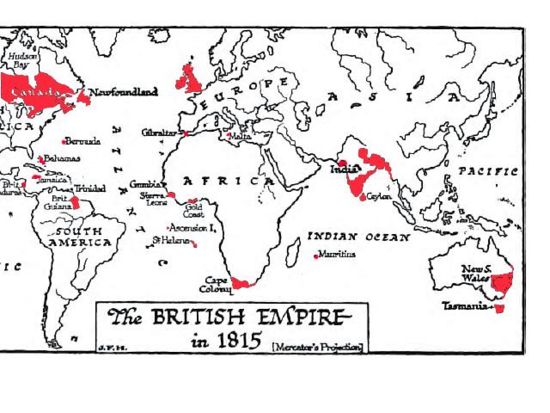British Empire
The British Empire was the worldwide domain controlled by Britain from its origins about 1600 until independence was granted to the dominions of Canada, Australia, New Zealand and South Africa in the 1920s, India and Pakistan in 1947, and the other colonies such as Kenya in the 1960s. It became the Commonwealth of Nations in 1920, which has never been more than a discussion forum. Of all the empires in world history, the British and Roman have gained the most attention.
The term "British Empire" was used by historians as early as 1708.[1] before that the usual term was "English Empire."[2]
First Empire
The European powers after 1500 had national governments with centralized military and navy power, financial resources, religious impulses and military technology. Some of them--Portugal, Spain, England, France, and the Netherlands especially, wanted overseas colonies to bolster their economic, religious and political ambitions, and provide an outlet for the energies of ambitious young men. England (Britain after 1703) was the most successful because it resisted the ambitions of Spain and, in a series of wars in the 18th century, defeated France in North America and India.
First efforts, 1497-1640
Portugal and Spain built the first empires, based on the wealth of Brazil and Mexico and Peru. England was allied with Portugal, but was a foe of Spain, a much larger country with a stronger navy in the century after Columbus. The English responded as predators, raiding and seizing Spanish ships, under the cover of "privateering" authorized by the government. Spain in 1588 sent a major fleet (the Armada) to conquer England, but it was destroyed by storms, and Spain lost her superiority at sea. England set out small expeditions to claim land (such as Newfoundland, settled in 1610) and set up bases to raid the Spanish main. Most of the early efforts were of small scale, and failed, such as the "Lost Colony of Roanoke" (1585-87), where a hundred settlers in North Carolina simply vanished. The small settlement at Jamestown miraculously survived and once the value of native tobacco was appreciated it became the nucleus for the highly successful colony of Virginia. In 1619 the Virginians set up an elected legislative assembly, the house of burgesses, which is now the state legislature. Religion motivated some 30,000 Puritans, a community-oriented, modernizing group that settled Massachusetts and Connecticut, and created the Yankee model of being American.
13 American colonies
The English captured the Dutch colony of New Amsterdam in 1664 and renamed it New York. Each of the 13 American colonies was different, but typically a colony was ruled by a governor appointed from London who controlled the executive administration and relied upon a locally elected legislature to vote taxes and make laws. By the 18th century, the American colonies were growing very rapidly because of ample supplies of land and food, and low death rates. They were richer than most parts of Britain, and attracted a steady flow of immigrants, especially teenagers who came as indentured servants. The tobacco and rice plantations imported black slaves from the British colonies in the West Indies, and by the 1770s they comprised a fifth of the American population. The question of independence from Britain did not arise as long as the colonies needed British military support against French and Spanish power. London regarded the American colonies as existing merely for the benefit of the mother country.
Second Empire
End of Empire
Gentlemanly capitalists and the economics of Empire
Imperial policy was set by London-based financial and mercantile interests. Gentlemanly capitalism was the nexus of landed, financial, and service elites that dominated politics and the economy in Britain and were the driving force behind imperial expansion. That is, "gentlemanly capitalists" in Britain set policy, while the dominions were run by a dependent and collaborating elite.[3]
Culture of the Empire
The Victorians saw themselves as the vanguard of western civilization, as pioneers of industry and progress. They were confident in their ability to improve the human condition everywhere, and of their capacity to turn potential wealth into reality. Their formula was liberalism, that is the release private enterprise from the dead hand of the state. They believed that unending social energy would flow from the interplay of free minds, free markets and Christian morality. The Victorian outlook, furthermore, was suffused with a vivid sense of moral superiority, religious mission and self-righteousness. Across the globe the Canningites and Palmerstonians worked endlessly to bring about conditions favouring commercial advance and liberal awakening. Since the 1970s, historians more attuned to the sensitivities of the colonized people have challenged the effectiveness of the imperialists.[4]
Maps
West Indies in 1763[5]
India in 1763[6]
Empire in 1783, showing the lost American colonies in gray[7]
India in 1857 [8]
South Africa, 1910 [9]
Africa in 1881[10]
Indian Ocean area 1920 [11]
Suez Region, 1922 [12]
notes
- ↑ John Oldmixon, The British Empire in America, Containing the History of the Discovery, Settlement, Progress and Present State of All the British Colonies, on the Continent and Islands of America (London, 1708))
- ↑ As in Nathaniel Crouch, The English Empire in America: Or a Prospect of His Majesties Dominions in the West-Indies (London, 1685). Armitage pp 174-5
- ↑ Cain and Hopkins (2001); Dumett, 1999
- ↑ Ronald Robinson and John Gallagher with Alice Denny, Africa and the Victorians: The Climax of Imperialism (1968), pp 1-4
- ↑ Robinson (1922) p 49
- ↑ Robinson (1922) p 89
- ↑ Robinson (1922) p 129
- ↑ Robinson (1922) p 195
- ↑ Robinson (1922) p 265
- ↑ Robinson (1922) p 292
- ↑ Robinson (1922) p 325
- ↑ Robinson (1922) p 345

![West Indies in 1763[5]](/wiki/images/thumb/4/48/W-indies1763.jpg/120px-W-indies1763.jpg)
![India in 1763[6]](/wiki/images/thumb/9/95/India1763.jpg/90px-India1763.jpg)
![Empire in 1783, showing the lost American colonies in gray[7]](/wiki/images/thumb/3/3a/Empire1783.jpg/120px-Empire1783.jpg)
![India in 1857 [8]](/wiki/images/thumb/5/51/India1857.jpg/120px-India1857.jpg)
![South Africa, 1910 [9]](/wiki/images/thumb/b/ba/S-africa.jpg/120px-S-africa.jpg)
![Africa in 1881[10]](/wiki/images/thumb/5/51/Africa1881.jpg/101px-Africa1881.jpg)
![Indian Ocean area 1920 [11]](/wiki/images/thumb/2/28/Indian-ocean.jpg/120px-Indian-ocean.jpg)
![Suez Region, 1922 [12]](/wiki/images/thumb/8/8b/Suez1920.jpg/120px-Suez1920.jpg)